
ERDE
Scope & Guideline
Bridging the Gap Between Earth Sciences and Social Understanding.
Introduction
Aims and Scopes
- Sustainability and Social Justice:
The journal emphasizes the need for sustainable practices that promote social equity, particularly in developing regions. It explores themes such as living wages, fair trade, and the socio-economic conditions of marginalized communities. - Interdisciplinary Approaches:
ERDE encourages interdisciplinary research, integrating perspectives from geography, sociology, economics, and environmental studies. This approach allows for a comprehensive understanding of complex global issues. - Environmental Governance and Policy:
The journal investigates the role of governance and policy in addressing environmental challenges. It examines case studies that highlight the effectiveness of policies in managing resources and promoting sustainability. - Food Systems and Agriculture:
A core area of focus is on food systems, including agricultural practices, food security, and the impacts of globalization on local food environments. The journal seeks to address the challenges and innovations in food production and consumption. - Urban and Regional Development:
ERDE explores urbanization and regional development issues, particularly in the Global South. It examines the dynamics of urban spaces, the impact of economic policies, and the role of local authorities in fostering sustainable development.
Trending and Emerging
- Living Incomes and Wages in Supply Chains:
There is a growing emphasis on living wages and incomes, particularly in the context of fair supply chains. This theme addresses the socio-economic conditions of workers in various industries, shedding light on issues of equity and justice. - Impact of the Anthropocene:
Research exploring the Anthropocene—a term used to describe the current geological age viewed as the period during which human activity has been the dominant influence on climate and the environment—is increasingly prevalent. This theme addresses the socio-political implications of environmental changes. - Food Environments and Sustainability:
Emerging studies focus on the transformation of food environments, addressing issues such as unhealthy consumption practices and unsustainable food systems. This area highlights the critical intersection of health, environment, and social justice. - Spatial Dynamics in Urban Development:
The analysis of spatial dynamics, particularly in urban settings, is gaining traction. This includes studies on short-term rental markets, urban cooperation, and the implications of urbanization on sustainability. - Environmental Conflicts and Movements:
There is an increasing interest in environmental movements and conflicts, particularly in the Global South. Research in this area examines grassroots activism and the socio-political contexts of environmental disputes.
Declining or Waning
- Traditional Environmental Studies:
Topics centered around traditional environmental studies, such as basic ecological assessments and biodiversity alone, have seen a decline. This shift reflects a growing interest in integrated socio-environmental frameworks that consider human impacts alongside ecological concerns. - Historical Perspectives on Geography:
Research focusing solely on historical perspectives in geography has become less frequent. Instead, there is a trend towards applying historical insights to contemporary issues, indicating a preference for practical applications of historical knowledge. - Rural Development in Isolation:
Studies examining rural development in isolation from broader socio-economic contexts are becoming less common. The current trend favors research that connects rural issues with urban dynamics and global economic trends. - Local Case Studies without Global Context:
Publications focusing exclusively on localized case studies without linking them to global themes and discussions are declining. The journal now emphasizes the significance of situating local phenomena within larger, global narratives.
Similar Journals
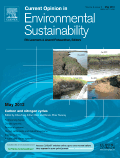
Current Opinion in Environmental Sustainability
Championing Collaboration in Sustainability ScienceCurrent Opinion in Environmental Sustainability, published by Elsevier Science Ltd, is a leading academic journal that specializes in exploring innovative strategies and emerging trends in environmental sustainability. With an impressive impact factor that reflects its esteemed position within the field, this journal is classified as Q1 in both the Environmental Science and Social Sciences categories for 2023, indicating its high-quality and influential contributions. The journal has been at the forefront of sustainability discussions since its inception in 2009 and continues to provide a platform for multidisciplinary research and critical analysis. As a key resource for researchers, professionals, and students alike, Current Opinion in Environmental Sustainability ensures open access to valuable insights while fostering collaboration and knowledge sharing across various domains. This journal not only serves to inform and inspire but also aims to address the pressing challenges of sustainability in our evolving world, making it an essential read for anyone engaged in environmental studies.

Journal of Australian Political Economy
Unraveling the complexities of Australia's economic landscape.Journal of Australian Political Economy, published by the Australian Political Economy Movement, serves as a crucial platform for interdisciplinary scholarship in the realms of political economy, sociology, and economics. With an ISSN of 0156-5826 and an E-ISSN of 1839-3675, this esteemed journal is known for its rigorous peer-reviewed articles that contribute to the understanding of economic issues and their sociopolitical contexts in Australia and beyond. Indexed in Scopus, it holds impressive quartile rankings—Q2 in Sociology and Political Science and Q3 in Economics and Econometrics—demonstrating its relevance and impact within the academic community. The journal's emphasis on qualitative and quantitative analyses encourages researchers to explore critical themes that shape societal structures and economic policies, making it an essential resource for students, scholars, and professionals aiming to deepen their understanding of political economy. With a convergence period from 2008 to 2024, the Journal of Australian Political Economy continues to forge new paths in scholarly discourse and provide cutting-edge insights into pressing societal issues.

Elementa-Science of the Anthropocene
Advancing interdisciplinary insights for a sustainable future.Elementa: Science of the Anthropocene is an esteemed Open Access journal published by University of California Press, dedicated to advancing interdisciplinary research that addresses the complexities of the Anthropocene epoch. Since its inception in 2013, it has established itself as a leading platform for the dissemination of innovative ideas across several disciplines, including atmospheric science, ecology, environmental engineering, geology, geotechnical engineering, and oceanography, achieving Q1 status in each of these fields as of 2023. With an impact factor reflecting its significant contribution to the scholarly community, Elementa ranks favorably in various Scopus categories, being placed in the 88th percentile in Earth and Planetary Sciences for both Geology and Oceanography. The journal's open-access model ensures that valuable research findings are accessible to a broader audience, fostering collaboration among researchers, professionals, and students dedicated to tackling pressing environmental challenges. Located in Oakland, California, Elementa continues to uphold a mission that underscores the importance of sustainable solutions and comprehensive understanding of the Anthropocene.

Revista Pensamiento Americano
Unveiling the Interactions Shaping American SocietyRevista Pensamiento Americano, published by CORP UNIV AMER, is an esteemed journal focused on advancing the field of social sciences, with particular attention to the dynamics of thought and culture in the Americas. With its ISSN 2027-2448, it serves as a vital platform for researchers, professionals, and students seeking to explore the multifaceted interactions that shape societal values and intellectual discourse within the region. The journal adheres to rigorous academic standards, contributing significantly to the body of knowledge with insightful research articles, reviews, and theoretical discussions. Although specific metrics on impact factors and H-index are currently unavailable, Revista Pensamiento Americano remains committed to fostering an open academic dialogue and offering invaluable resources for scholars engaged in the study of American thought processes and cultural identity. Located at CRA 53 NO 64-142, BARRANQUILLA 00000, COLOMBIA, the journal exemplifies a dedication to intellectual excellence and the dissemination of knowledge, making it an essential resource for those exploring the complexities of contemporary society.
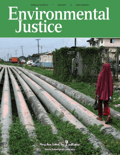
Environmental Justice
Pioneering research at the intersection of environment and equity.Environmental Justice is a leading interdisciplinary journal published by MARY ANN LIEBERT, INC that provides a vital platform for the exploration of environmental issues through the lens of social equity and justice. With a strong focus on the intersection of geography, health, and policy, this journal spans topics from spatial inequality to public health implications related to environmental risks. Since its inception in 2008, the journal has gained recognition, achieving a Q1 ranking in Geography, Planning, and Development and a Q2 ranking in both Health, Toxicology, and Mutagenesis as well as Management, Monitoring, Policy, and Law. The journal is an essential resource for researchers, policymakers, and practitioners alike, reflecting the increasing importance of environmental justice in addressing global challenges. Although it does not operate under an open-access model, the comprehensive insights published in Environmental Justice are instrumental for advancing scholarly discourse and practical applications in the field.
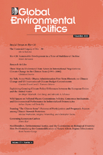
Global Environmental Politics
Exploring Innovative Insights in Global Environmental Governance.Global Environmental Politics, published by MIT Press, serves as a pivotal platform for interdisciplinary research that intersects the fields of environmental science, political science, and sustainability. Established with the aim to address the most pressing global environmental challenges, this journal has achieved prestigious recognition, placing in the Q1 category across multiple disciplines such as Global and Planetary Change and Political Science and International Relations as of 2023. With an impressive Scopus rank of #23 out of 706 in Political Science and International Relations, it appeals to a diverse audience by publishing high-quality, peer-reviewed articles that contribute to knowledge and policy frameworks essential for promoting sustainability and effective governance. Researchers, professionals, and students engaged in environmental studies will find this journal invaluable for exploring innovative ideas, policy analyses, and case studies designed to foster informed decision-making in an era of rapidly changing ecological and political landscapes. Access to the journal's articles is available through standard subscription options, ensuring that critical research remains accessible to the academic community.
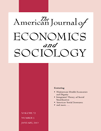
AMERICAN JOURNAL OF ECONOMICS AND SOCIOLOGY
Illuminating Economic and Social Dynamics Through Research.American Journal of Economics and Sociology is a distinguished peer-reviewed journal published by Wiley that serves as a vital platform for researchers and professionals in the fields of economics and sociology. With a publication history spanning from 1941 to the present, this journal covers a diverse range of topics, promoting interdisciplinary research and fostering a deeper understanding of social and economic phenomena. Although it operates on a traditional subscription model, its contributions are widely recognized, earning it an impactful position within the academic community, reflected in its current 2023 Scopus Rankings— positioned in the top quartile for Sociology and Political Science and notable recognition in Economics and Econometrics. The journal is based in the United Kingdom and aims to enhance discourse and collaboration across economic and sociological domains, making it an essential resource for students, educators, and policymakers alike.

AGRICULTURAL HISTORY
Exploring the Roots of Agriculture and HistoryAGRICULTURAL HISTORY, published by DUKE UNIVERSITY PRESS, is a prominent academic journal that has been a vital resource in the fields of agricultural sciences and historical studies since its inception in 1975. With an ISSN of 0002-1482 and E-ISSN of 1533-8290, this journal holds an impressive reputation reflected in its SCImago rankings: it ranks in the Q2 quartile in Agricultural and Biological Sciences (miscellaneous) and Q1 in History, highlighting its relevance and scholarly impact. The journal serves as a platform for groundbreaking research that explores the intricate relationships between agriculture and society throughout history. Though not an open access journal, the content is widely regarded for its rigor and depth, appealing to researchers, professionals, and students interested in understanding the role of agriculture in shaping historical narratives and contemporary issues. The journal remains committed to advancing knowledge within its scope while fostering critical discourse across disciplines.
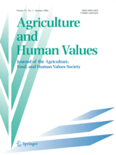
AGRICULTURE AND HUMAN VALUES
Transforming agricultural research into actionable change.AGRICULTURE AND HUMAN VALUES is a leading interdisciplinary journal published by SPRINGER, focusing on the intricate relationships between agricultural practices, environmental sustainability, and human well-being. With an impressive impact factor and ranking in the Q1 quartile across various fields including Agronomy and Crop Science, Geography, Planning and Development, and Sociology and Political Science, this journal provides a vital platform for researchers and professionals to explore the social, economic, and cultural dimensions of agriculture. As a prominent outlet since its inception in 1984, it aims to contribute to the dialogue on sustainable practices and policies that impact food systems globally. The journal caters to a diverse readership, including scholars, policymakers, and students, ensuring that critical research findings reach those who can influence change. With a solid reputation and commitment to advancing knowledge in these essential areas, AGRICULTURE AND HUMAN VALUES remains an invaluable resource for those dedicated to improving agricultural practices and human health in a rapidly changing world.

Agricultural Economics-Zemedelska Ekonomika
Fostering collaboration through open-access research.Agricultural Economics-Zemedelska Ekonomika is a prominent open-access journal published by the Czech Academy of Agricultural Sciences, dedicated to advancing the field of agricultural economics and related disciplines. Since its inception in 2007, this journal has provided a vital platform for researchers, professionals, and students to disseminate and engage with cutting-edge insights and empirical studies that contribute to the understanding of agricultural practices, economic theories, and policy analysis. With an impressive impact factor reflected in its 2023 quartile rankings of Q2 in both Agricultural and Biological Sciences and Economics, Econometrics and Finance, the journal ranks highly among its peers, specifically occupying the 46th position out of 288 in General Economics and 40th among 193 in Agricultural Sciences, highlighting its broad relevance and respected status. The journal's open access model ensures that research is widely disseminated and easily accessible, fostering an inclusive academic environment that encourages collaboration and knowledge sharing. With a commitment to publishing quality research until at least 2024, Agricultural Economics-Zemedelska Ekonomika remains a crucial resource for those dedicated to improving agricultural productivity and sustainability through economic insight.